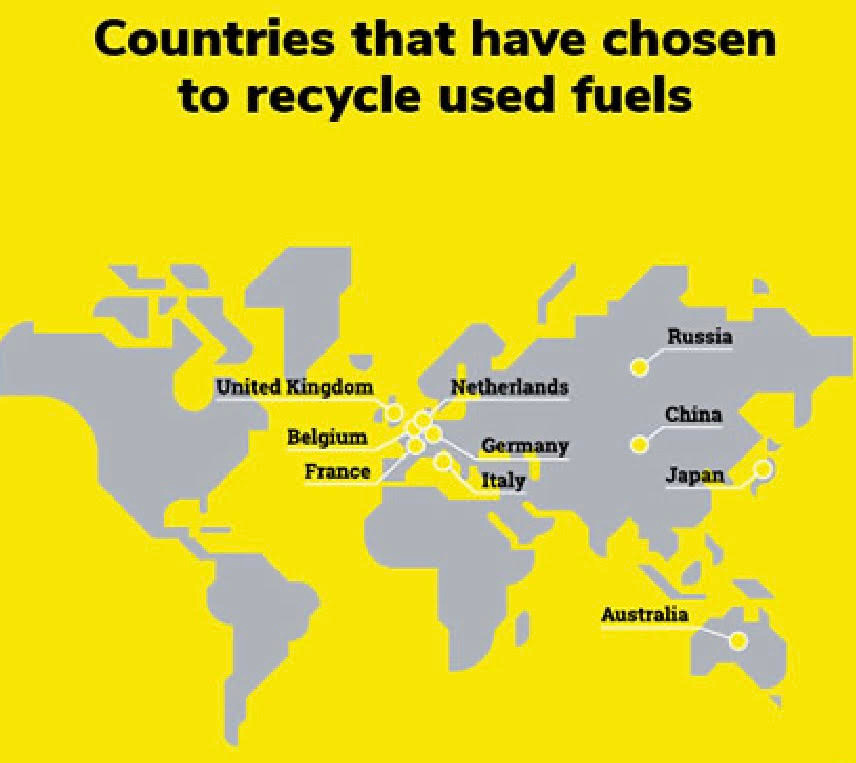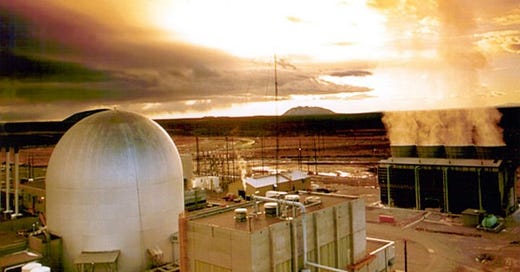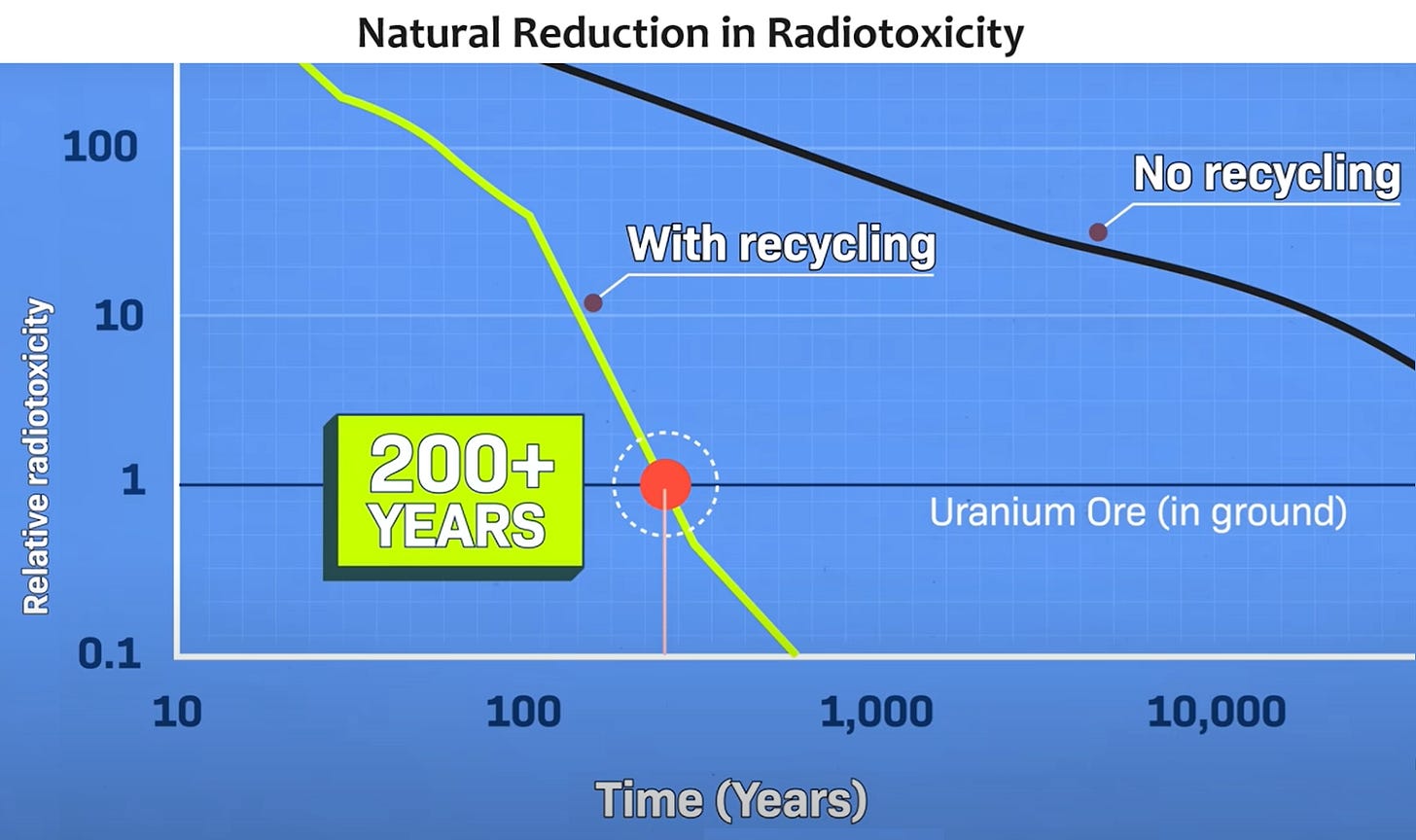The surprising reason why we should recycle nuclear waste
If you care about efficiency, radiation, or emissions, you'll want to know about this
My most-read post was on nuclear waste, but there’s an area I barely touched upon because it deserves its own post: spent fuel recycling.
We should recycle nuclear waste, but few people know why.
First, there is currently enough energy in the stored nuclear waste in the United States to power the entire country for 100 years. That's 100 years of clean energy sitting in storage casks, doing nothing.
As I covered before, thanks to its high energy density, very little nuclear fuel is required to produce large amounts of electricity, especially compared to other energy sources. This means that the resulting waste is very small - on average, the waste from a reactor supplying a person’s electricity needs for a year would be about the size of a brick. Roughly 5 grams of this is high-level waste, which is about the same weight as a sheet of paper.
Most of the material in used fuel can be recycled - as much as 97% of it. In some countries, like France, Japan, and Switzerland, used fuel is already reprocessed, but other countries, most notably the US, treat used nuclear fuel as waste and leave it sitting in storage casks… Doing nothing.

You may be surprised to learn that the technology to turn nuclear waste into energy, known as a nuclear fast or breeder reactor, is not a new technology. It has existed for decades – and - here’s another surprise - it was developed in the US in 1951. The Experimental Breeder Reactor 1 (EBR-1) was a nuclear reactor that could use nuclear waste as fuel. It was developed by a US government research facility called the Argonne National Laboratory. This place was a hub of scientific discovery - nearly all operating commercial nuclear power plants worldwide have roots in research that took place at Argonne.
A breeder reactor is a nuclear reactor that generates more fissile material than it consumes. Using them would enable us to power the planet for billions of years without much need for freshly mined uranium. The EBR-1 was the world's first breeder reactor and one of the world's first electricity-generating nuclear power plants. It initially produced enough electricity to illuminate four 200-watt light bulbs and later generated sufficient electricity to power its building.
Tragically, the EBR-1 was decommissioned in 1964 and is now a US National Historic Landmark situated in the desert near Idaho. Even more tragically, the country that developed the technology - the US - does not recycle its nuclear waste. In 1994, the US Congress terminated funding for most of Argonne's nuclear programs. Interest in recycling spent fuel declined after the 1960s, as more uranium reserves were found, and it was deemed to be cheaper to mine uranium and less controversial than building more nuclear infrastructure at home following years of protests against nuclear energy by anti-nuclear activists.
The vast majority of the world's nuclear power plants - roughly 70% of the global reactor fleet – are light-water nuclear reactors, but almost any reactor design can be tweaked to become a breeder. The light-water reactor has evolved into the fast reactor concept, where the fission chain reaction is sustained by fast neutrons.
There are currently five fast reactors in operation: two operating reactors and one test reactor in Russia, one in India, and one in China.
The reasons for recycling waste are obvious - Japan cites energy security, conservation, and reduced waste production. But the most compelling reason that most people aren’t aware of is that recycling spent fuel reduces its radioactivity and, therefore, the time it requires in storage. We currently have to store spent fuel for tens of thousands of years, but by reprocessing the waste, the radioactivity and corresponding need for storage can be reduced to just 200 years.
Orano, a nuclear fuel cycle company headquartered in France, describes the final recycled waste as “5-times less in volume, 10-times less in radiotoxicity.”
If you’re afraid of radiation, you should love the idea of recycling spent fuel, as it’s the best way to reduce its radioactivity. Whether or not you like the idea of new nuclear power plants, there is existing nuclear waste stored in facilities around the world, and there is a proven method for significantly reducing its radioactivity. This method resolves both the need to store the casks for longer periods of time and also provides clean energy without the need to mine new resources. It is, surely, any environmentalist’s dream come true.
All methods of energy generation require mining, resources, and have a carbon footprint. Using these measures, nuclear energy is already very environmentally friendly. Recycling spent fuel would bring down the mineral use of nuclear power plant construction as well, making nuclear energy the most environmentally friendly method of energy generation available to us today.
I can already hear people arguing that it is too expensive to recycle nuclear waste, but there is no comprehensive cost analysis of doing so. If there was no economic sense in it, countries like the UK wouldn’t have recycled their waste for years, and France would not continue to do so (France has also recycled the largest amount of waste to date). In all likelihood, it isn’t more expensive to recycle waste than to mine for fresh resources like uranium and then store the waste in casks for tens of thousands of years.
Discussions of nuclear energy costs tend to focus on the initial investment and ignore the returns. Washing your dirty laundry by hand is also technically cheaper than the alternatives, but I doubt you refuse to use washing machines. A washing machine may appear to be a potentially expensive item up front, but in the long run, it is cheaper than buying new clothes or expending huge amounts of time and energy to wash dirty clothes by hand. It is also more water-efficient to employ technology for this laborious task. Now let’s power the washing machine with recycled nuclear waste as well.
Nuclear waste is not ‘waste’. It is a valuable clean energy resource with significant environmental benefits, just waiting to be recycled. Surely that’s better than doing nothing.








As a Brit until 1987, I remember the Dounreay Fast Reactor in Scotland. Sadly shut down in 1977. We are so many decades behind where we should be with nuclear power!
As an irrelevant and self-indulgent comment: A couple of years after Dounreay was shut down, I was in huge CND (Campaign for Nuclear Disarmament) march in London. I felt a bit alien because I was the ONLY person I talked to who was anti-nuclear weapons AND pro-nuclear power. Why would you be against both? They are radically different things.
A couple of years later, anti-nuclear (all kinds) activist Helen Caldicott gave a talk at my school. She showed a dramatic presentation that revealed the effects of dropping a nuclear bomb on a nuclear reactor. She wasn't at all open to my inquiry as to whether the nuclear power plant had much to do with the outcome.
I fully support the idea of recycling nuclear waste, but I must pour some water in your enthusiasm: Germany, as shown in your map of already recycling countries, is definitely NOT doing so. Instead we shut down our remaining working reactors in a sad dogmatic fulfilment of Green ideology. They just couldn't retract on their decade long vilification of everything nuclear ... :-(